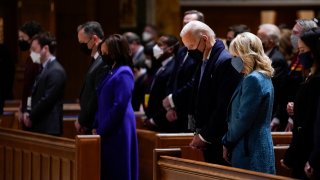
Throughout his political career, President Joe Biden's Catholic faith has always been a major presence: He attends Mass every Sunday and has spoken about the importance of religion in his life; and on Inauguration Day, he will be sworn in using a 127-year-old family Bible.
After the swearing-in ceremony on Wednesday, Biden will be the second Catholic to lead the United States, the first since John F. Kennedy in 1961. However, the two leaders differ greatly in their stances on social issues: Kennedy did not challenge the Catholic Church's positions, according to NBC affiliate KXAN, while Biden has expressed support for abortion rights and gay marriage.
"It was a really big deal that Kennedy was a Catholic in the 1960s coming off the rise of the Protestant establishment in the 1950s. The differences between Protestant and Catholics were pretty stark in the minds of most Americans,” Chad Seales, an associate professor of religious studies at the University of Texas at Austin, told KXAN.
Biden's position on these issues has caused controversy among some religious leaders: In November 2019, he was denied Holy Communion at a church in South Carolina while on the campaign trail.
Get top local stories in Philly delivered to you every morning. >Sign up for NBC Philadelphia's News Headlines newsletter.
The Rev. Robert E. Morey told a local newspaper at the time that "any public figure who advocates for abortion places himself or herself outside of Church teaching." Biden told MSNBC's Andrea Mitchell that he was "not going to discuss" the incident.
Seales said that religion may be less important to voters now, while a candidate's stance on moral issues is more relevant. According to exit surveys from Gallup, Joe Biden won 52% of the Catholic vote; in 1960, it's estimated that Kennedy received about 80% of that vote.
"It is now more important where you stand on a particular moral issue politically than whether you're a Protestant or Catholic," Seales said.
U.S. & World
Stories that affect your life across the U.S. and around the world.
Seales added that Biden's political stances might mirror future changes in the larger Catholic Church.
"It will be interesting to see, too, the direction the Catholic Church shifts, if at all, in the next four years with some of the stances Pope Francis has taken on certain issues as well," Seales said.
Biden and the pope spoke soon after the election was called for Biden; according to CNBC, the call touched on Biden's "desire to work together on the basis of a shared belief in the dignity and equality of all humankind" on issues like climate change, immigration reform and "caring for the marginalized and the poor."
Biden has also posed himself as a voice for unity, saying that he wants to heal the country's "hurting soul." Seales said that it's hard to tell if Biden's faith will help in that goal.
“We’ve seen it in past presidents drawing on the worlds of civil religions to frame a shared American imagination,” Seales said. “That’s really been undermined the last four years to the extent that it is difficult to know if religion will resonate across political divides.”
This story first appeared on TODAY.com. More from TODAY:



